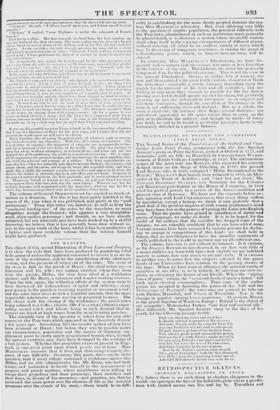THE HAMLETS.
THE object of this second Illustration of Poor Laws and Paupers, is to show the evils that. have been produced by permitting relief to be granted unless the applicant consented to receive it as an in- mate of the workhouse, and by the introduction of the allowance system, and the payment of wages out of the rates. The scene of
the story is laid in the parish of Hurst : the chief actors are—a fisherman and his wife; two orphan children whom they farm
front the parish; Miller, the very beau ideal of a workhouse
toaster; and Mr. Barry, a volunteer and wonder-working overseer. When the tale opens, the withering effects of the system seem to have destrosed all independence of' spirit and industry ; every poor person in the parish is receiving regular or occasional relief ; and the rates have risen to such a frightful amount, that the more
respectable inhabitants seem moving or preparing to move. The tale closes with the closing of the workhouse; the parish-rates being reduced to a trifle ; c !rarity (Dr. Cis ALMERS.S theory) super- seding casual relief, and labour being in such demand that la- bourers are hired at high wages from the neighbouring parishes.
The scientific view of the question is taken from the very able papers on the Poor-laws which appeared in the Quarterly Review a few years ago. Something like the results spoken of may have
been attained at Hurst; but before they can be possible under any circumstances, population and the means of obtaining em- ployment must be pretty nearly proportioned to each other, though the natural condition may have been deranged by the working of a bad system. Whether this proportion exists at present in Eng-
land, is one great point upon which people are at issue. Miss MARTINEAU assumes that it does, and thus compendiously dis-
poses of one difficulty. Granting this point, there can be little question, that if every village contained a workhouse-master like Miller, and an able administrator like Mr. Barry, who had both leisure and inclination to devote bins-elf to the management of paupers and parish matters; whose neighbours were willing to forego their prejudices and their patronage, their crotchets and their fears, in favour of his measures,—and granting, too, that he possessed the same power over the chances of life as the novelist possesses over the events of his story,—there would be no difif- culty in establishing for the more thinly-peopled districts the sys- tem Miss MARTINEAU advocates. But, even allowing very little to the question of surplus population, the practical difficulty with the Poor-laws, administered as such an institution must generally be administered, is to discover a system whose invariable routine shall adapt itself to the varying circumstances of different places, without refusing all relief to an endless variety of eases which may be deserving of temporary assistance, or risking the grant of a discretionary power, which, as long as men are men, will be abused.
In resiewing MISS MARTINEAU'S Illustrations, we have fre- quently Lad to remark that the seienee was more or less forgotten in the interest of the tale. But hitherto, the novel has generally compensat,al us for the political economy. This is not the case in the present Illustratien. Scenes, or rather bits of scenery, are now and then painted with great troth; mid the character of Monk the fisherman—originally a sturdy lounger, depending upon the parish for the payment of his east and all casualties, and un- willing to earn inure thaw euseosh to provide ea. the day that is passing over, lest it should operate against his claim, but gradually growing up into the independent rate-payer—is an original and felicitous conception, though the exesution of the change in the man is not sufficiently clear and distinct. But as a w lude, the story is eked out ; the interest often flags; several dialogues are introduced apparently to fill space rather than to carry on the plot or to illustrate the subject; and though no marks of hurry can Eddy be said to be found in particular passages, haste is un- fortunately detected in a general flatness.




















 Previous page
Previous page